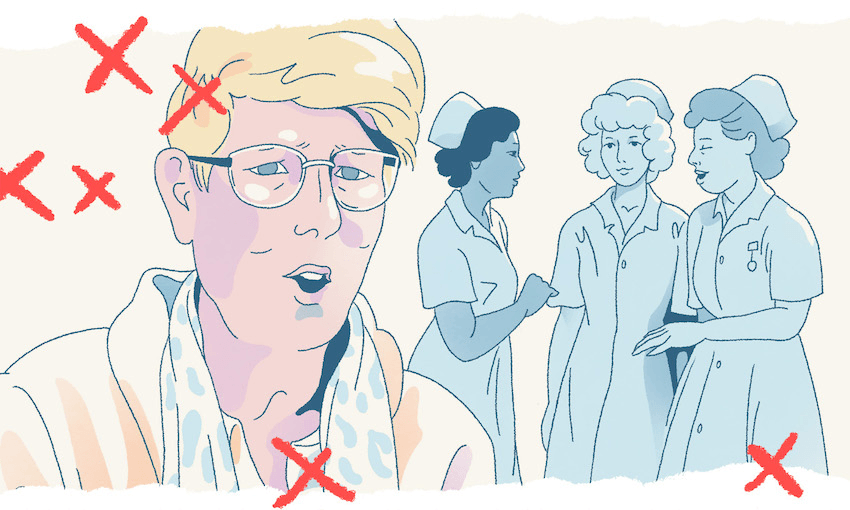As an exuberant and openly lesbian 18-year-old training to be a nurse in Christchurch in the early 1970s, Joan Bellingham encountered openly homophobic teaching staff. At the end of her first year she was mysteriously committed to a psychiatric ward at the city’s Princess Margaret Hospital for ‘treatment’. There she was misdiagnosed with schizophrenia among other non-existent conditions and subjected to 12 years of excessive medication, violent and repeated electric shock therapy and humiliating “punishments”. Finally discharged in 1982, Joan has spent the past 40 years seeking recognition and redress for those damaging years.
This article is part of The Quarter Million, exploring the Royal Commission of Inquiry into Abuse in State Care. Read the introduction here.
Illustrations by Rebecca ter Borg.
Content warning: This feature describes physical, sexual and emotional violence, child abuse and neglect. If this is difficult for you and you would like some help, these services offer support and information: Auckland specialist service Help, 0800 623 1700; specialist men’s service Male Survivors Aotearoa, 0800 044 334; and Snap (Survivors network of those abused by priests). Please take care.
I was born in Christchurch in 1952 and grew up in a close-knit family – my mother, grandmother and my sister were all nurses and I decided that was also my calling in life.
At about age 18 I finished high school and left home to train to be a nurse at Burwood Hospital. It was 1970 and the course was meant to take three years. I was happy there to start with. I loved my nursing and I had lots of friends. We used to go out and socialise, which was sometimes frowned upon by our training staff. Many things that are socially acceptable now weren’t in the 70s – sexuality wasn’t often talked about publicly. But I’ve been gay for as long as I can remember and I never saw it as something that I needed to hide away.
At Burwood, word got around that I was gay and I was constantly picked on. One tutor, in particular, really took offence. She’d make snide remarks or stare straight at me and say that homosexuality was wrong. She wrote comments on grade papers saying, “If you thought you were going to be a nurse you’re wrong.” I remember feeling terribly ashamed.
As the months passed my time at Burwood became more and more difficult. I believe to the staff I was perceived as not conforming. Things came to a head on one occasion when I was accused by that same tutor of stealing drugs off a trolley. This was totally false. It was after this incident that things really escalated.
On December 21 1970 I was told I needed treatment and was taken to Princess Margaret Hospital and admitted to a psychiatric ward that same day. I didn’t have my clothes or anything with me.
All I remember is being terrified and telling them this was a mistake, but they wouldn’t listen. They gave me drugs to quieten me down. My mother was being deeply anxious that I was in hospital – she wanted to know why I needed to be there. They thought I might have a neurotic personality disorder. You didn’t question the doctor’s authority during those times. They were like gods.
I was 18 and I didn’t realise it at the time, but I would spend the next 12 years in and out of that hospital and would never get to complete my nursing training. I was admitted and discharged 24 times between 1970 and 1982.
The hospital became part of me and when they told me to go home sometimes I didn’t want to go. I had become totally institutionalised. I believe this was due to the astounding amount of antipsychotic medication I was constantly given. They never explained what it was or what it was for. They also never talked about the side effects. The dosage was excessive. My medical notes say that on May 31, 1977 I had six micromoles per litre of chlorpromazine in my blood when the therapeutic range was 1.6 to 2.2 micromoles per litre.
They also performed electroconvulsive therapy on me. I believe this was over 200 times during the course of the 12 years. I would be told the night before that I’d have shock treatment the next day and not to have anything to eat. They would give me a muscle relaxant to paralyse me which felt like razor blades going through my body. You were fully awake during this time. You could see the silver machine and the assistants holding the electrodes which they would place around my head before I became unconscious. Every time after shock therapy I would vomit and cry and often beg them not to do it again. They would not listen or respond. Sometimes it caused me to become completely blind and it would take a couple of days for my vision to fully return.
I ended up with seeping electrode burns on my scalp. Hairdressers sometimes comment on my head burns. Perhaps the most damaging effect the ECT has had is my loss of memory. I cannot remember anything about key events in my life, particularly during my 20s. I often find I cannot remember old friends.
I complained at the time about my memory loss. The doctor would always call me “girl”. He would say “No need to worry, girl, it will come back.” I would tell my parents, but they never questioned authority. My memory got blurrier and blurrier. I felt like I’d never be believed. I also have severe tinnitus and severe headaches, which I believe is a result of my treatment.
In 2000, I was diagnosed with hepatitis C. It is possible this was contracted through non-disposable electrodes being used during ECT.
One time I was put into a room with nothing in it. I needed to go to the toilet at night; there were no bells. I’d been given a large amount of drugs and I couldn’t walk. I couldn’t make it to the toilet, so I peed on the floor for which I was punished. I was like a walking zombie. I felt so humiliated. I felt like I had no reason to live.
I was often given enemas of soap and water as a punishment. On one occasion I tried to jump in a river because of the drugs. I got severely reprimanded for the carpet being wet when I came in and was given an enema.
I can recall the doctor who I would see once or twice a week. He would ask me all sorts of questions about being a lesbian.”How many times a week do you have sex with your partner?” and, “What is it like?” I would become very scared and not want to be left in the room alone with him.
One of the things he said to me was, “Girl I’d just like you to know that I really don’t want you to have children because your children, there’s a high possibility they’ll be intellectually disabled like you.” I probably wouldn’t have had children, but that certainly stopped me.
On one of the times I was allowed out for the day, I went on a date with a guy arranged by an old school friend, who thought if I just went out with a guy my sexuality might change. This guy came to my parents’ place and Mum said, “Please don’t give Joan any alcohol if you’re taking her out for lunch because she’s on quite a large dose of medication”, and he said “Of course, no, no, no”.
The first place he took me was this pub and all I can remember is being plied with alcohol and I can’t remember any lunch. Then he took me back to his family bach – for him, his wife and his children – and he attempted to rape me there and plied me with honey mead wine or cider until I was almost comatose and didn’t have the strength to fight him off. Then he took me back to my parents’ place and pushed me out of the car. Mum and Dad immediately thought I’d taken an overdose. I was rushed to Princess Margaret Hospital and given a stomach pump for the drugs that I’d supposedly had and that was the end of that. Then there was a long stem in hospital and no-one really knew what happened, I was never asked and I was too ashamed to say.
As I became institutionalised I would ask for ECT and they would give it to me. It was a form of self-loathing, which I believe was caused by the medication.
I was beginning to hate myself more and more, and in the end I just self-harmed all the time. So, consequently, I’ve got scarring, terrible scarring on my wrists, which is a horrible reminder of the past.
My parents thought doctors were always right, but at the same time they could see their daughter declining in hospital when you’re meant to go to hospital to get well, and I was getting sicker and sicker.
After I was discharged the last time, there was never any follow-up from the hospital despite years and years of treatment.
Over the years, I tried numerous ways to get recognition and redress.
I complained to my local MP for Wigram, Jim Anderton. He helped me a lot. He wrote a letter to the associate minister of health, Jonathan Coleman, pointing out that I had spent all of my inheritance money on expensive lawyers’ fees, seeking redress. Mr Anderton also wrote to attorney-general Chris Finlayson:
A letter from Jim Anderton to the Honourable Christopher Finlayson, then attorney-general, in August 2010: “After her last admittance in 1983, Joan decided to go cold turkey and come off all drugs. She has had no mental health symptoms since and the late Dr Les Ding, formally of Sunnyside Hospital, stated that the diagnosis of schizophrenia was wrong.”
A letter of support from Joan’s GP, Dr Michael Glen, August 2010: “I understand Joan was diagnosed as schizophrenic and was treated with a variety of psychotropic medications and ECT. Since I have known Joan, for the last 24 years, I have seen her through a variety of stresses in her life, but she has never exhibited any signs of mental disorder. She has never had any delusions, hallucinations or been out of touch with reality. Her mood has been remarkably stable, despite some quite traumatic times over those years and… has shown great resilience and strength… She has remained stable, stoical and bears little bitterness… I suspect her life path may have been very different if not for her medical treatment”.
I feel very sad that I didn’t continue my nursing training. I think my life would have certainly taken a different turn.
My only family member I have now is my dear sister, who’s a professional person with a medical background. Although we’re very close I can’t talk to her about my experiences, and she won’t acknowledge what happened. I think it’s too hurtful for her and that’s the only thing in my life that I’ll go to my grave really sad about, that I haven’t been able to talk to my sister about it.
This is an edited version of Joan Bellingham’s statement to the Royal Commission of Inquiry into Abuse in Care.

